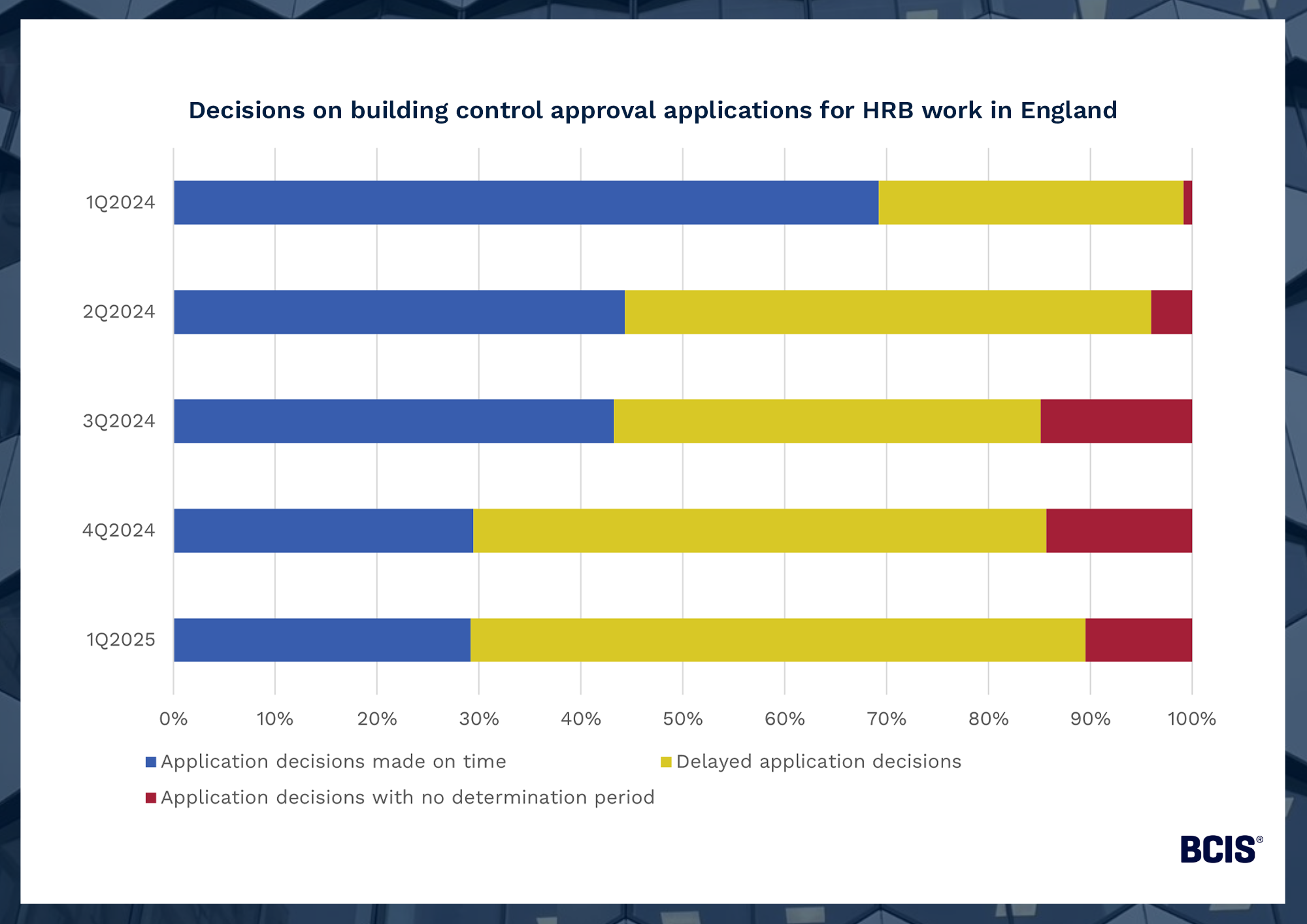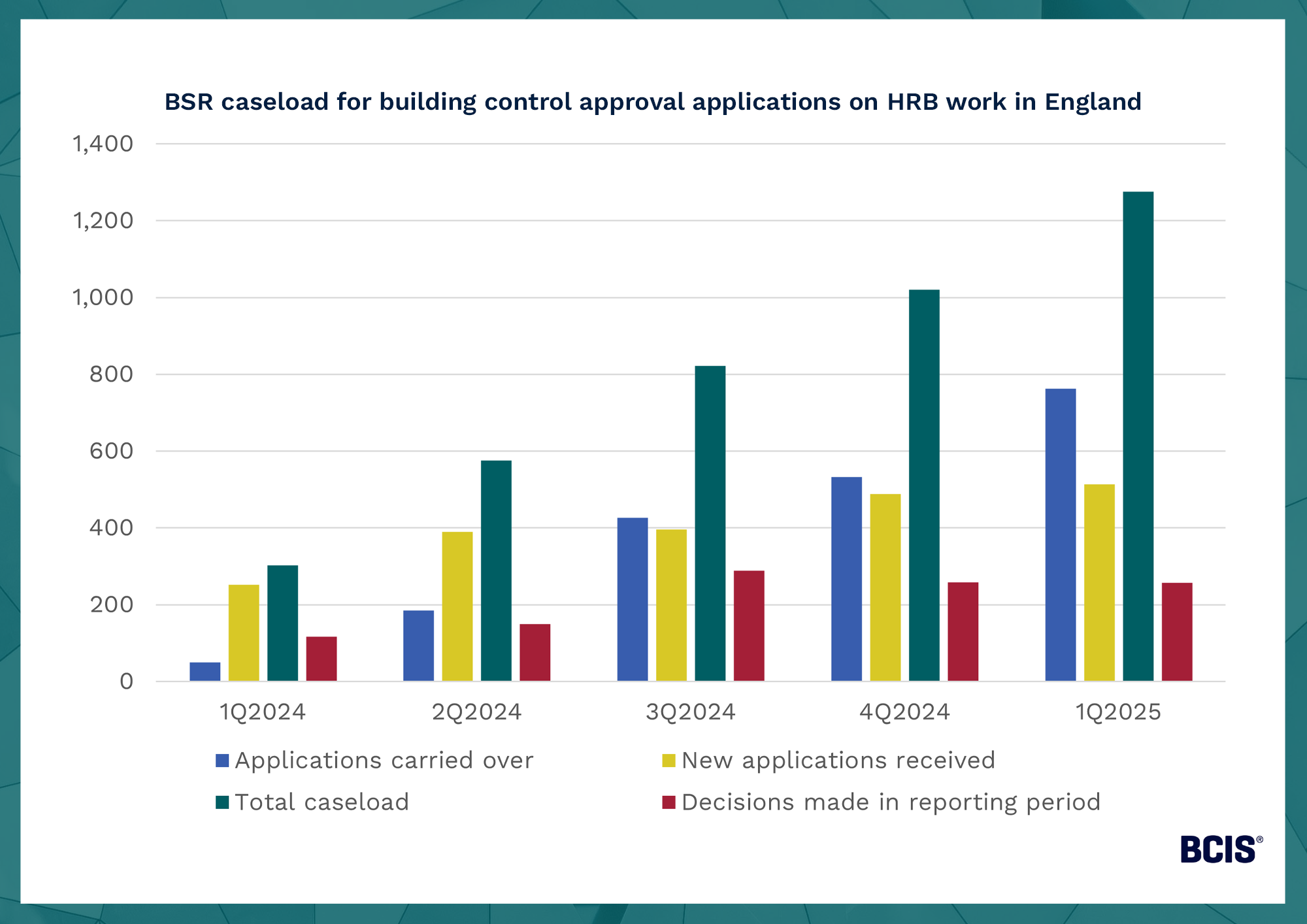The Building Cost Information Service (BCIS) is the leading provider of cost and carbon data to the UK built environment. Over 4,000 subscribing consultants, clients and contractors use BCIS products to control costs, manage budgets, mitigate risk and improve project performance.
Published: 18/07/2025
In July 2025, the Health and Safety Executive (HSE), acting as the Building Safety Regulator (BSR), released data on building control approval applications for works on higher-risk buildings (HRBs) in England, from October 2023 to March 2025(1).
Building control approval is a statutory requirement for works on HRBs and is needed for projects to start.
HRBs are those with at least seven storeys; are at least 18 metres high; are a hospital or care home, and/or contain two or more residential units.
Delayed decisions on higher-risk building applications quadrupled in 1Q2025
New data from the Building Safety Regulator (BSR) show that delayed decisions on higher-risk building (HRB) applications in England increased by 443% between 1Q2024 and 1Q2025.
The data refers to applications made for building control approval of work on new and existing HRBs.
Building control approval is necessary for HRB projects to pass Gateway 2 – a stop/go point where work on HRBs is assessed against building regulation requirements before it’s allowed to take place.
According to regulation, decisions on building control approval applications for new build HRBs must be made within a 12-week determination period. Decisions for work on existing HRBs must be made in eight.
In the first quarter of 2025, 155 (60.3%) of 257 decisions on applications were delayed. By comparison, 35 (29.9%) of the 117 decisions made in 1Q2024 were delayed.
The jump in delayed decisions appears to have been driven by growth in the BSR’s caseload.
The total caseload in 1Q2025 was more than triple (323%) the caseload in 1Q2024. Meanwhile, the percentage of applications where decisions were made within the determination period, fell from 70% to 33% in the same period.
Source: Building Safety Regulator
Dr David Crosthwaite, chief economist at BCIS, said: ‘Delayed decisions on higher-risk building applications have a wide-reaching and detrimental impact on the construction sector. BCIS expert panellists – cost consultants whose experiences help to inform movement in our tender price indices – have reported that approval delays at Gateways 2 and 3 are having a significant impact, pushing back project starts and putting pressure on resource management.
‘Looking at the data, the BSR has not performed effectively since 2Q2024. In most cases, making decisions within the determination period is a statutory requirement and with a growing caseload, the need for process reforms is clear.’
The median time taken for decisions where an application was approved rose from 13.7 weeks in 1Q2024 to 25.1 weeks in 1Q2025.
The only decisions consistently made on time in this period were for invalid applications – those that do not pass the validation process or have been marked inactive with no determination made.
Looking at caseload trends, there were over 1,000 applications still awaiting a decision at the end of March 2025. This was a 451% increase on the backlog recorded at the end of March 2024.
Source: Building Safety Regulator
Over half (59.8%) of the caseload in 1Q2025 comprised outstanding applications from previous quarters. This was an increase of 1,426% on the 50 outstanding applications seen in 1Q2024.
Applications for building control approval on HRB work have been submitted to the BSR since October 2023 which explains the rising caseload over this period.
Publication of the data followed the announcement of reforms to the BSR that include a new ‘Fast Track Process’ intended to support housebuilding activity.
This will introduce building inspector and engineer capacity to the BSR to improve the processing and review of existing new build cases and remediation decisions.
The BSR will also no longer be part of the HSE and will move into the Ministry for Housing, Communities and Local Government. The timeline for these reforms is yet to be confirmed.
To keep up to date with the latest industry news and insights from BCIS, register for our newsletter here.
(1) GOV.UK – Building Safety Regulator building control approval application data October 2023 to March 2025 - here


